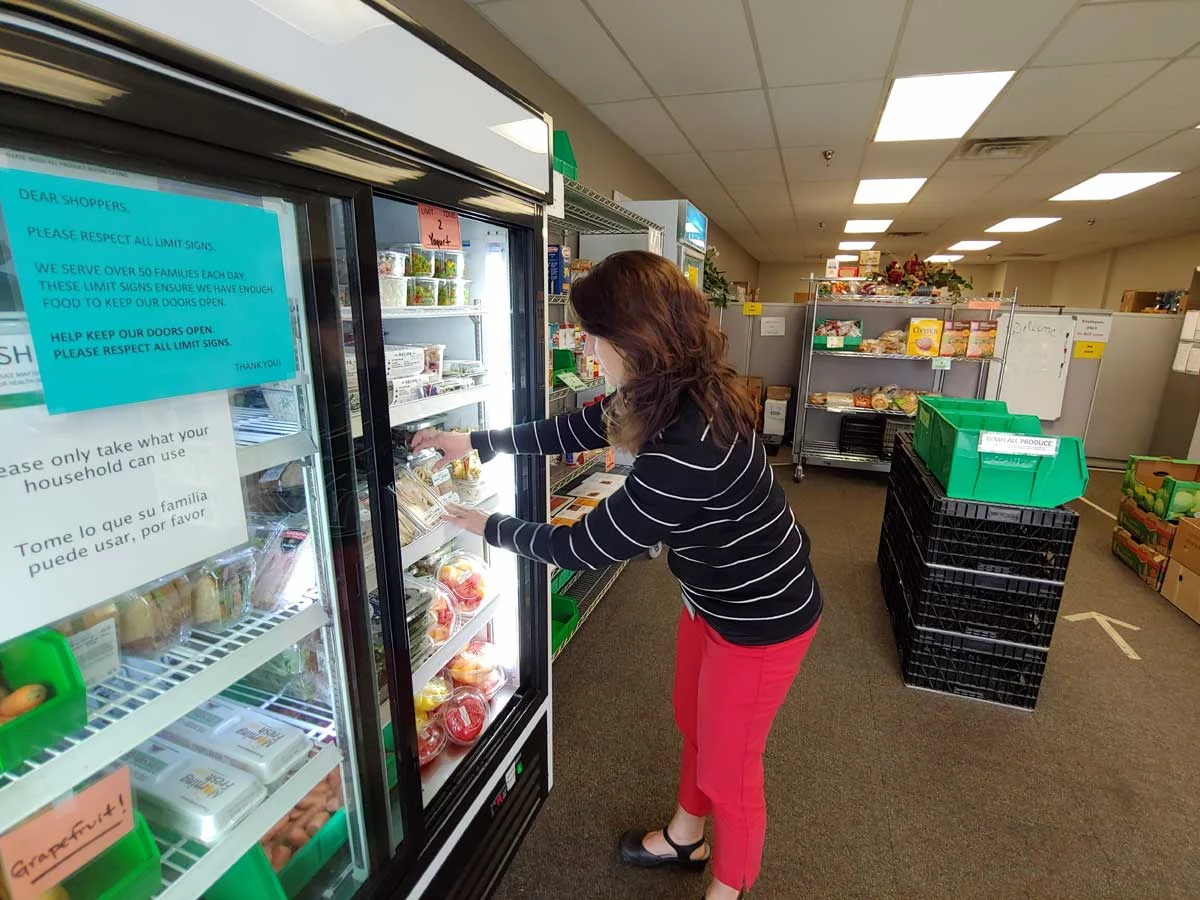
The connection between hunger and health is so strong that providers at the UCHealth Family Medicine Center are now directing patients to their new pharmacy.
It’s no ordinary pharmacy — it’s a food pharmacy.
“Food insecurity forces suboptimal health choices,” said Dr. David Marchant, the clinic’s medical director. “By addressing food insecurity, we empower people to make better health decisions, which leads to a happier and more fulfilling life for themselves and their families.”
In Suite 109, next door to FMC at 1025 Pennock Place in Fort Collins, Colorado, is the clinic’s new pantry. It provides patients with healthy foods and family meal ideas. It’s stocked with fresh fruits and vegetables, canned and packaged staples including beans and pasta, and refrigerated items donated from the local Sprouts Farmers Market.
“To think that a single mom on a limited income coming in for a child well check can now come in here and get pita bread, some sauce, a block of cheese and make her kiddos pizza with fresh veggies,” said Deirdre Sullivan, program supervisor for UCHealth Community Health Improvement in northern Colorado. “(June 5) was our first day with refrigerated food. We had our first person leave with a bag of all fresh food — you know how great that feels?”

In late 2015, the American Academy of Pediatrics asked providers across the country to add two routine questions to the list they ask patients’ parents:
- Within the past year, were you worried whether your food would run out before you got money to buy more?
- Within the past year, did the food you bought not last, and you didn’t have money to get more?
The idea was to gauge food insecurity, but the issue for FMC, Sullivan said, was that if a patient answered yes to these questions, providers didn’t have a way to meet such an immediate need. That feedback led to a mission to connect the food bank and community resources to the clinic and their patients.
“We saw it as an opportunity to help our patients,” Marchant said. “Admittedly, there were some hurdles to overcome, but we felt that the need in the population was high enough, it was worth the effort. We all know that lifestyle dramatically impacts health, and if people are struggling to simply find any food to eat or are competing with paying for a medication or paying for food, their health will suffer.”
The UCHealth Community Health Improvement team got together with the Food Bank for Larimer County to find a solution, and they found a model for a clinic food pantry at Boston Medical Center’s Grow Clinic, where patients fill prescriptions for supplemental, healthy foods based on a referral from a physician.
The UCHealth team created a pilot program to assess population need, pantry preferences and possible utilization. The pilot included a Supplemental Nutrition Assistance Program (SNAP) component with the goal of increasing enrollment in the food stamp program. The food bank had already identified through their own research that FMC was located in an area outside of convenient food bank boundaries.

FMC is a primary care and residency-training practice that serves about 150 patients daily, 70 percent of whom are low-income Medicaid enrolled. Two thirds of families screened at the clinic said they had food insecurity, and nearly half of those people were not enrolled in SNAP. Patient interest in an on-site food pantry was at an overwhelming 90 percent for those with food insecurity, representing almost 60 percent of all FMC patients, Sullivan said.
A strong partnership has emerged among UCHealth, the food bank and UCHealth Community Health Improvement’s Vida Sana program, whose mission includes increasing access to healthy food and enrollment in SNAP.
Pre-filled bags of food are given to each patient who screens positive for food insecurity — 8,702 pounds of food were distributed in the first month — and Vida Sana has already followed up with hundreds of families to enroll them in SNAP, Sullivan said.
In April, an FMC employee break room was converted into UCHealth’s first food pharmacy. It opened with mostly dry goods but allowed families to “shop” for their own food. On June 5, the first of weekly (and free) supplies of food from Sprouts Farmers Market in Fort Collins arrived, filling the food pantry’s refrigerators with about 400 pounds of fresh items, such as produce, dairy and lunch meats. Because deliveries come on Sundays, volunteers from Serve 6.8 Ministry have agreed to pick up and deliver for the program.

To help boost efforts, the food bank applied for and received a ConAgra grant that will provide $20,000 to implement a summer food backpack program for children in Poudre School District who are served by the McBackpack program during the school year, since it doesn’t run in the summer. That part of the food pantry started mid-June, Sullivan said.
The funding also will provide a part-time pantry manager to oversee volunteers, who are now staffing the food pantry three days a week: Mondays, Tuesdays and Fridays. The manager will have a nutrition background, which will allow food pantry visitors to receive education on healthy eating based on their dietary restrictions and provider recommendations, Sullivan said.
“Moving forward, we will be looking for additional funding opportunities to sustain staffing and operational costs; and the integration of the pantry use into EPIC (UCHealth’s electronic medical records system) so we can track health outcomes associated with addressing food insecurity in this integrated care model,” she said.
“My hope is we will be able to show a measurable improvement in health outcomes based on the use of the food pantry and the food bank,” Marchant continued. “So far, we have seen many tears of joy at the chance to have good food for their families. It has been an unexpected patient benefit of having a clinic visit with us. I believe we can and should be a leader in this in our region of the world.”
